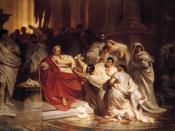When Brutus speaks to the Romans, he has two purposes. His first and more important purpose is to persuade the audience that Caesar's murder was justified. His second purpose is to introduce Mark Antony. He accomplishes this second purpose better than the first. He implies that he is a "good guy" for letting Caesar's best friend speak, but he is naïve when he decides not to stay to listen to Antony. Brutus should get an "F" grade on his speech, while Antony is rewarded with an "A". Brutus's speech is practically a failure.
Brutus makes his first mistake when he disperses half of his audience. "Those that will hear me speak, let 'em stay here; / Those that will follow Cassius, go with him... (Act III, Scene 2, lines 5-6). Brutus does not have the authority of a powerful leader. By showing that Cassius is equal in power and authority, Brutus makes himself less important.
The most serious flaw in Brutus's speech is that he is not specific or detailed; he is too ambiguous. This is the essence of Brutus's argument: You know that I am an honorable man. (What does he mean by honorable? Is it honorable to assassinate a leader for the reasons Brutus offers?) I loved Caesar as much as you did, but Caesar was a threat to Rome because he was ambitious. Brutus is vague about Caesar's "crimes"; he never explains how Caesar was ambitious or why his ambition was harmful. In fact, the word "ambitious" is a poor choice because it often has favorable connotations as well as negative ones. For example, we admire someone for being ambitious and striving to achieve a high goal. But Brutus assumes that ambition is all bad. He fails to provide any convincing evidence to prove that Caesar...


